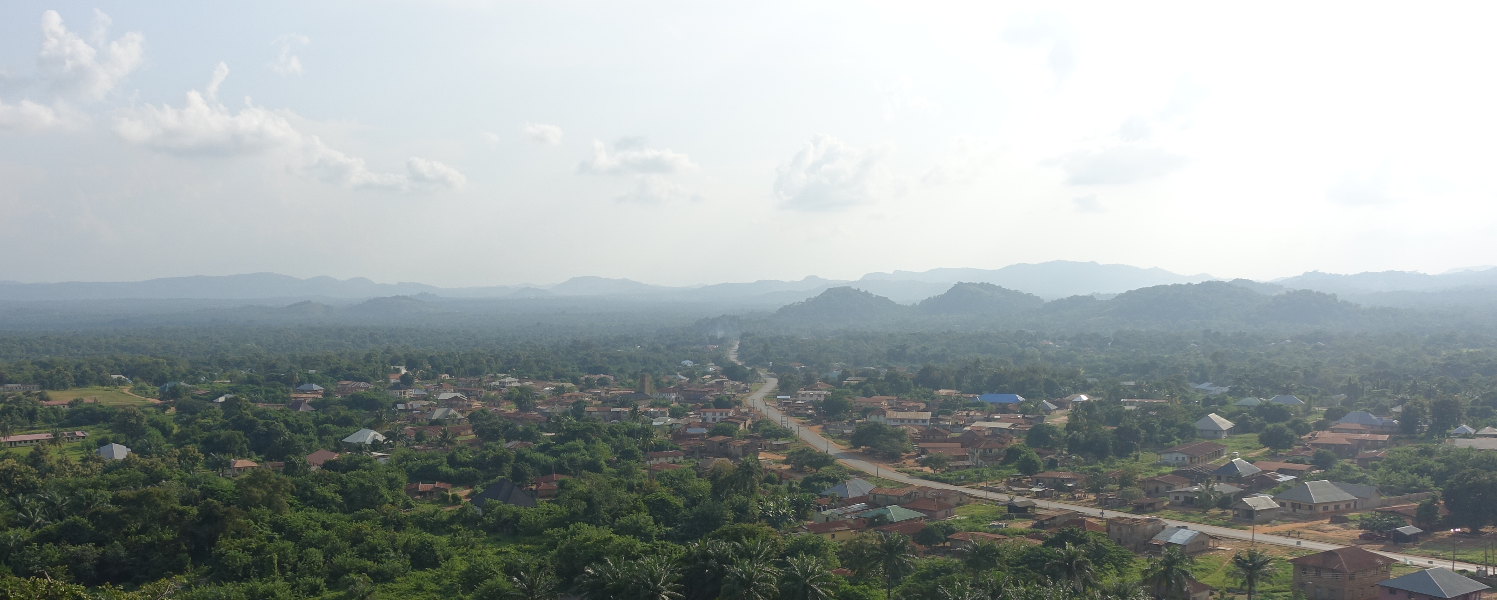Acknowledgments
This digital reference grammar is part of my PhD project "A Digital Reference Grammar of Abesabesi" and therefore deserves the same acknowledgments as given in the thesis: It has not only been the result of many hours of work, but also of generous amounts of help and advice by multiple people I would like to thank.
I am most grateful for the people of Ikaram, who welcomed and accomodated me in their town, taught me about their language and culture, answered my questions and took care of me. I thank H.R.M Andrew Momodu, the Akala of Ikaram, for accepting me at the palace and providing me with a temporary home, for a lot of advice and for presenting me to the people of Ikaram. I thank Dr. Taiwo Agoyi for being my first anchor in the Akoko hills, for inspiring my research, for presenting me to all the great researchers and students at Adekunle Ajasin University in Akungba, for bringing me to Ikaram and for all the moral support during my field trips. I thank Olori Adenike and Olori Ilile for taking such good care of me, providing me with ever delicious meals and making the palace feel like home. I thank Arohunmolase Haruna for taking care of my security, showing me all the nice places of Ikaram and climbing the hills with me. I thank Steven Ayodele Awolami, Chief Abiodun Afolabi, Chief Alice Elegbeleye, the Eleperi Chief Olaniran Samuel Jimo for the never ending wealth of stories you could tell me, for all the songs and proverbs you taught me and for all the help you provided for my research. Thank you Laisi Rafiu for translating stories and narratives for me, for being patient with me and for putting up with all of my questions. I also thank Mama Joy for providing me with biscuits, snacks and anything else I needed, and for teaching me bits of your language. And I am grateful for all the other speakers that told me stories, translated sentences and helped me with my questions. Their names are Janet Akeju, Bashiru Naibi Aminu, Caroline Elegbeleye, Prince Olubunmi Victor Daudu, Medinat Folashade Oludade, Adeolu Mercy Funke, Alamo Idris Alooma, Shittu Samuel Aderemi, Ajatta Adebowale Ilesanmi, Friday Jimo Ibrahim, Weehab Aminu Oshono, Victoria Aderinsola Ayetoro, and Kayode Seth Banfe. I am truely grateful to all of you!
I also want to thank everybody that supported me at the University of Cologne. First of all, my first supervisor Birgit Hellwig, who was always there when I needed feedback, support, or any advice from funding over academic writing to fieldwork methods. Thanks for all your efforts and enthusiasm, I could not have imagined a better supervisor! Many thanks also to my second supervisor Andreas Witt, who directed me on my path through the digital humanities and gave valuable advice and feedback on the development of this grammar and its data format, and on my thesis. Additional thanks go to my third supervisor Nikolaus Himmelmann, and my former office mates Felix Rau and Luiz Antonio de Sousa Netto. Thank you for inspiring thoughts, a comfortable working atmosphere and all your feedback. Lena Wolberg has helped me out in numerous situations: organizing my finances, ordering my equipment, and so many more. Thank you for your support, your efficiency, your organizing skills, and all the nice conversations!
For all support regarding TEI, thanks to Toma Tasovac and Laurent Romary, who taught at the Lexical Data Masterclass and who haved continued giving me feedback and advice on my data format. For technical support, I would like to thank the Data Center for the Humanities (DCH) and the Cologne Center for eHumanities (CCeH) - especially Patrick Helling, Sviatoslav Drach, and Jonathan Blumtritt. Thank you for helping me set up and host the application and for providing me with support for existDB. I am also very grateful for the financial support I received to make this research possible. I was granted a PhD scholarship from the a.r.t.e.s. Graduate School for the Humanities Cologne and benefited from their support and infrastructure. I have received valuable feedback and inspiration from my graduate class supervised by Martin Becker and Nicolas Pethes. The fieldwork would not have been possible without the funding of the Endangered Languages Documentation Programme (ELDP) who awarded me a small grant. I am grateful for your support and the opportunity to deposit my research data in the Endangered Languages Archive (ELAR). A very special thank you goes to Sophie Salffner, who was my first signpost to Ikaram. I am truely grateful for suggesting to work on Abesabesi, for getting me in contact with Taiwo, for providing lots of inspiration through your archive deposits and research and for all your feedback and support. I would not have gotten to know Ikaram without you!
A big thank you goes to my dear friend Sarah Dopierala, who made all my sentences beautiful and gave me tons of feedback, inspiration and support throughout my PhD. And finally, I would like to thank my family and friends who gave me strength and supported me during this PhD project.
